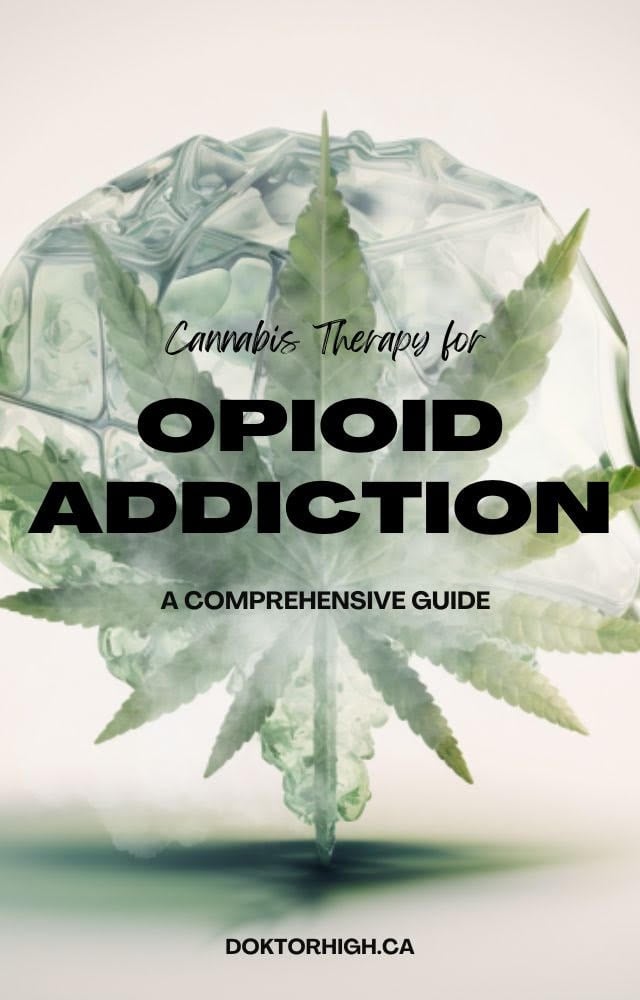"Medical Cannabis Therapy: A Promising Alternative in the Battle Against Opioid Addiction"
Explore the potential of medical cannabis as a therapy for opioid addiction. Understand its uses, the scientific evidence supporting it, and its role in the opioid crisis.
David Johnson
6/18/202311 min read


Introduction
The opioid crisis, a public health emergency that has gripped nations worldwide, particularly the United States, has been a source of significant concern for decades. This crisis, characterized by the overuse and misuse of opioids, including prescription pain relievers, heroin, and synthetic opioids such as fentanyl, has led to a surge in addiction rates and overdose deaths. The Centers for Disease Control and Prevention estimates that nearly 50,000 people in the United States died from opioid-involved overdoses in 2019 alone. The impact of this crisis extends beyond the individual, affecting families, communities, and the healthcare system.
In the midst of this dire situation, a potential beacon of hope has emerged: medical cannabis therapy. Medical cannabis, also known as medical marijuana, refers to the use of the Cannabis plant or its basic extracts as a form of medicine. It's not the same as recreational marijuana, which is used for its "high." Medical cannabis is used to treat diseases or conditions. It's been found to help with a variety of health conditions, from chronic pain and epilepsy to multiple sclerosis and PTSD.
The potential of medical cannabis therapy for opioid addiction is a relatively new area of interest. The idea is that medical cannabis could serve as a safer alternative to opioids for managing chronic pain, one of the main reasons people turn to opioids in the first place. Additionally, it's thought that medical cannabis could help alleviate the withdrawal symptoms associated with opioid addiction, making the recovery process more manageable.
This blog post aims to delve into the potential of medical cannabis therapy for opioid addiction. We'll explore the scientific evidence supporting this potential solution, discuss the current state of research, and look at the implications for individuals struggling with opioid addiction and for society as a whole. The goal is to provide a comprehensive, evidence-based perspective on this emerging area of interest in the field of addiction treatment.
The Opioid Crisis
The opioid crisis, a term that has become all too familiar in recent years, refers to the rapid increase in the use of prescription and non-prescription opioid drugs in the United States and Canada in the late 1990s. This crisis has escalated over the years, leading to devastating consequences, including a significant number of deaths annually. In 2021 alone, over 106,000 persons in the U.S. died from drug-involved overdose, including illicit drugs and prescription opioids.
The opioid crisis is not just a statistic; it's a reality that countless individuals and families face every day. The fear and anxiety associated with opioid addiction are palpable, as it affects not only the individuals suffering but also their families and communities. The crisis has been a major concern for medical professionals and officials who are constantly seeking effective strategies to manage and mitigate its impact.
The main drugs involved in the opioid crisis include prescription opioids, heroin, and synthetic opioids like fentanyl. Prescription opioids are often prescribed for pain relief but can lead to addiction if misused. Heroin, an illegal drug, is often used as a cheaper alternative to prescription opioids. Synthetic opioids, primarily fentanyl, are extremely potent and often mixed with other drugs, leading to a high risk of overdose.
The crisis has prompted a nationwide response with various strategies being implemented to combat it. These include increasing access to treatment, reducing unmet treatment need, and reducing opioid overdose-related deaths. Despite these efforts, the crisis continues to persist, highlighting the need for innovative and effective solutions.
One such potential solution that has emerged is medical cannabis therapy. This therapy leverages the pain-relieving properties of cannabis to potentially alleviate withdrawal symptoms and reduce the need for opioids, thereby reducing the risk of addiction and overdose. However, the use of medical cannabis therapy for opioid addiction is still under extensive research, and its efficacy and safety are yet to be fully established.
It's important to note that while the opioid crisis is a complex and multifaceted issue it's one that can be addressed through concerted efforts, innovative solutions, and persistent research. The potential of medical cannabis therapy for opioid addiction offers a glimmer of hope in this ongoing battle and it's a topic that warrants further exploration and discussion.
Understanding Medical Cannabis: A Potential Solution to the Opioid Crisis
Medical cannabis, also known as medical marijuana, has been gaining attention in the medical field for its potential uses in pain management and treatment of various conditions. Scientific evidence supports the use of medical cannabis in treating chronic pain, epilepsy, and multiple sclerosis, among other conditions. However, its use as a therapy for opioid addiction is still under extensive research.
Medical cannabis is derived from the Cannabis sativa plant, which contains over 100 different cannabinoids. Two of the most well-known and well-studied cannabinoids are THC (tetrahydrocannabinol) and CBD (cannabidiol). THC is the psychoactive compound that gives marijuana its "high," while CBD is non-psychoactive and has been noted for its potential therapeutic benefits.
The use of medical cannabis has been approved in many states across the U.S. for various medical conditions. These conditions often include chronic pain, epilepsy, and multiple sclerosis, where traditional treatment methods have been ineffective. The approval of medical cannabis use is typically based on substantial scientific evidence that demonstrates its effectiveness in treating these conditions.
In the context of the opioid crisis medical cannabis is being explored as a potential alternative to opioids for pain management. Chronic pain is one of the main reasons people are prescribed opioids, and unfortunately, this can lead to misuse and addiction. Medical cannabis, on the other hand, has shown promise in managing chronic pain without the risk of addiction. This potential use of medical cannabis is particularly relevant given the current opioid crisis.
It's important to note that while medical cannabis shows promise its use as a therapy for opioid addiction is still under extensive research. The complex nature of addiction requires comprehensive treatment approaches and while medical cannabis could potentially be part of the solution, it is not a cure-all. More research is needed to fully understand how medical cannabis can be used effectively in this context.
Despite the need for more research the potential of medical cannabis therapy for opioid addiction offers a glimmer of hope in the midst of the opioid crisis. As we continue to seek out effective strategies to combat this crisis, it's crucial to explore all potential solutions, including those that might seem unconventional.
Understanding medical cannabis and its potential uses is crucial in the context of the opioid crisis. While it's not a magic bullet, medical cannabis could potentially offer a safer alternative for pain management and a possible pathway to reducing opioid addiction. As research in this area continues to evolve it's important to stay informed and open-minded about the potential of medical cannabis therapy.
Medical Cannabis as an Alternative to Opioids: A Safer Pathway for Pain Management
Chronic pain is a prevalent health issue that affects millions of people worldwide. It's one of the main reasons people turn to opioids a class of drugs that includes powerful prescription painkillers such as oxycodone, hydrocodone, and morphine. While opioids can be effective in managing pain they carry a high risk of addiction and overdose, contributing to the ongoing opioid crisis.
In the search for safer alternatives to opioids, medical cannabis has emerged as a promising option. Medical cannabis, derived from the Cannabis sativa plant, has shown potential in managing chronic pain, among other health conditions. The plant contains over 100 different cannabinoids, including THC (tetrahydrocannabinol) and CBD (cannabidiol), which interact with the body's endocannabinoid system to produce various effects, including pain relief.
Several studies have suggested that medical cannabis can reduce the need for opioids, thereby reducing the risk of addiction and overdose. For instance, a survey conducted on more than 2,100 participants showed that roughly 90% of them found cannabis helpful in treating medical conditions. Of the over three-fifths of people taking opioids before using medical cannabis, around 79% reduced or stopped opioid use. Nearly 86% of patients who used medical cannabis said it helped reduce their pain.
It's important to note that the use of medical cannabis as an alternative to opioids is still under extensive research. While medical cannabis shows potential, more rigorous, large-scale studies are needed to fully understand its efficacy and safety profile. Furthermore, the use of medical cannabis should always be under the guidance of a healthcare professional, as it can have side effects, including dry mouth, increased appetite, and drowsiness.
The potential of medical cannabis as an alternative to opioids is particularly relevant in the context of the opioid crisis. In 2020, there were 70,168 opioid-related overdose deaths in the U.S., representing a 37% increase from the previous year. As the crisis continues to escalate, finding effective and safer alternatives to opioids for pain management is of utmost importance.
Medical cannabis presents a potential alternative to opioids for managing chronic pain. Its ability to reduce the need for opioids could play a significant role in addressing the opioid crisis. As we continue to explore this potential solution, it's crucial to stay informed about the latest research and to consult with healthcare professionals when considering medical cannabis for pain management.
Medical Cannabis Therapy for Opioid Addiction: A New Approach to an Old Problem
The opioid crisis has been a devastating public health issue, with opioids causing a significant number of deaths annually. Amidst this crisis, a potential solution has emerged: medical cannabis therapy for opioid addiction. This innovative approach works by leveraging the pain-relieving properties of cannabis, offering a new pathway for individuals struggling with opioid addiction.
Medical cannabis also known as medical marijuana, contains active components such as THC (tetrahydrocannabinol) and CBD (cannabidiol). These components interact with the body's endocannabinoid system, a complex cell-signaling system that plays a role in regulating a range of functions and processes, including pain, mood, appetite, and sleep. By interacting with this system, medical cannabis can alleviate pain and reduce withdrawal symptoms associated with opioid addiction.
Medical cannabis therapy for opioid addiction is backed by scientific evidence. A study published in the Journal of Pain found that medical cannabis use was associated with a 64% reduction in opioid use in patients with chronic pain. Another study in the Journal of the American Medical Association found that states with medical cannabis laws had lower opioid overdose mortality rates compared to states without such laws.
Despite these promising findings it's important to note that the use of medical cannabis as a therapy for opioid addiction is still under extensive research. While medical cannabis shows potential, more rigorous, large-scale studies are needed to fully understand its efficacy and safety profile. Furthermore, the use of medical cannabis should always be under the guidance of a healthcare professional, as it can have side effects, including dry mouth, increased appetite and drowsiness.
The potential of medical cannabis therapy for opioid addiction offers a glimmer of hope in the midst of the opioid crisis. As we continue to explore this potential solution it's crucial to stay informed about the latest research and to consult with healthcare professionals when considering medical cannabis for pain management.
Understanding how medical cannabis therapy works for opioid addiction is crucial in the context of the opioid crisis. While it's not a magic bullet, medical cannabis could potentially offer a safer alternative for pain management and a possible pathway to reducing opioid addiction. As research in this area continues to evolve it's important to stay informed and open-minded about the potential of medical cannabis therapy.


Case Studies and Research Findings:
The Role of Medical Cannabis in Opioid Addiction
The potential of medical cannabis therapy for opioid addiction is not just theoretical; it's backed by a growing body of scientific evidence. Several case studies and research findings have shed light on how medical cannabis can be used as a tool in the fight against opioid addiction.
One of the most compelling pieces of evidence comes from a study published in the Journal of Pain. The study found that medical cannabis use was associated with a 64% reduction in opioid use in patients with chronic pain. This significant reduction suggests that medical cannabis could potentially serve as an effective alternative to opioids for pain management, thereby reducing the risk of opioid addiction and overdose.
A study, published in the Journal of the American Medical Association found that states with medical cannabis laws had lower opioid overdose mortality rates compared to states without such laws. This finding suggests that the availability of medical cannabis could potentially reduce the number of opioid-related deaths.
These studies provide valuable insights into the potential of medical cannabis therapy for opioid addiction. However, it's important to note that while these findings are promising, more research is needed to fully understand the role of medical cannabis in opioid addiction treatment. The complex nature of addiction requires comprehensive treatment approaches and while medical cannabis could potentially be part of the solution it is not a cure-all.
The existing case studies and research findings offer a glimmer of hope. They suggest that medical cannabis therapy could potentially offer a safer alternative for pain management and a possible pathway to reducing opioid addiction. As we continue to explore this potential solution it's crucial to stay informed about the latest research and to consult with healthcare professionals when considering medical cannabis for pain management.
The case studies and research findings on medical cannabis therapy for opioid addiction underscore the potential of this innovative approach. While more research is needed the existing evidence suggests that medical cannabis could play a significant role in addressing the opioid crisis.
Challenges and Controversies: Navigating the Complex Landscape of Medical Cannabis Therapy for Opioid Addiction
Despite the promising potential of medical cannabis therapy for opioid addiction, several challenges and controversies exist. These include regulatory hurdles, lack of FDA approval, and the need for more rigorous, evidence-based research. While some states have legalized medical cannabis, it remains classified as a Schedule I drug at the federal level, indicating a high potential for abuse and no accepted medical use.
One of the main challenges in the field of medical cannabis therapy is the regulatory landscape. While medical cannabis is legal in many states, it remains illegal at the federal level. This discrepancy creates a complex legal environment that can be difficult for patients, healthcare providers, and researchers to navigate. Furthermore, the classification of cannabis as a Schedule I drug hinders research efforts, as it imposes strict regulations on the study of cannabis and its potential therapeutic uses.
Another significant challenge is the lack of FDA approval for medical cannabis. The FDA has approved some cannabinoid-based medications, but it has not approved the marijuana plant as a medicine. This lack of approval can limit access to medical cannabis for patients who might benefit from it. It also means that the quality and potency of medical cannabis products can vary, as they are not subject to the same rigorous standards as FDA-approved medications.
The need for more rigorous evidence-based research is another major challenge. While there is some evidence supporting the use of medical cannabis for opioid addiction more high-quality studies are needed to confirm these findings and to better understand the potential risks and benefits of medical cannabis therapy. The complexity of addiction and the potential risks associated with cannabis use underscore the need for careful rigorous research in this area.
While medical cannabis therapy holds promise for opioid addiction, it is not without its challenges and controversies. Navigating the complex regulatory landscape, addressing the lack of FDA approval, and conducting more rigorous research are all crucial steps in realizing the potential of medical cannabis therapy for opioid addiction.
Conclusion:
The Potential and Challenges of Medical Cannabis Therapy for Opioid Addiction
The opioid crisis is a complex and multifaceted issue that requires a comprehensive approach to address effectively. Amidst this crisis, the potential of medical cannabis therapy for opioid addiction has emerged as a promising alternative. However, it's important to note that while the potential is promising, more research is needed to fully understand its efficacy and safety.
The use of medical cannabis therapy for opioid addiction is backed by scientific evidence and clinical studies. A study published in the Journal of Pain found that medical cannabis use was associated with a 64% reduction in opioid use in patients with chronic pain. Another study in the Journal of the American Medical Association found that states with medical cannabis laws had lower opioid overdose mortality rates compared to states without such laws.
Despite these promising findings several challenges and controversies exist. These include regulatory hurdles, lack of FDA approval, and the need for more rigorous, evidence-based research. While some states have legalized medical cannabis it remains classified as a Schedule I drug at the federal level, indicating a high potential for abuse and no accepted medical use.
As we navigate the complexities of the opioid crisis it's crucial to explore all possible solutions including alternative therapies like medical cannabis. Individuals should always consult with healthcare professionals before making any decisions about their treatment. It's also important to stay informed about the latest research and developments in this field.
The potential of medical cannabis therapy for opioid addiction offers a glimmer of hope in the midst of the opioid crisis. Realizing this potential will require overcoming regulatory hurdles, conducting more rigorous research and ensuring that individuals have access to accurate information and professional medical advice.




